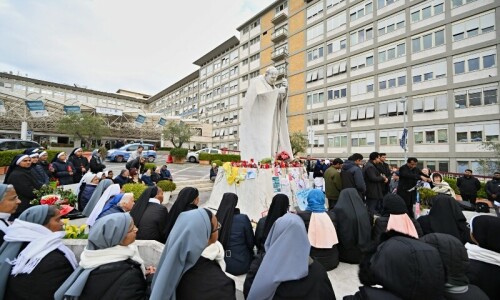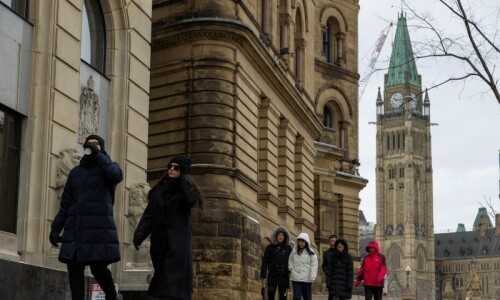
CAIRO/ROME: At least 28 Palestinians including children were killed on Thursday in an Israeli strike on a shelter in the northern Gaza Strip, a Gaza health ministry official said.
Several were also injured in the strike, said the official, Medhat Abbas, adding: “There is no water to extinguish the fire. There is nothing. This is a massacre.” “Civilians and children are being killed, burned under fire,” said Abbas.
Earlier on Thursday, Palestinian health officials said at least 11 Palestinians were killed in two separate Israeli strikes in Gaza City, while several others were killed in central and southern Gaza areas.
Ten bodies were brought to Kamal Adwan Hospital and four to Al Awda Hospital, the two medical facilities reported. The people were killed in an Israeli strike on the Abu Hussein school, which has become a shelter, in northern Gaza’s Jabalia.
345,000 Gazans face ‘catastrophic’ hunger this winter, says UN
Footage circulated by Palestinian media of the Abu Hussein School showed smoke coming from tents that caught fire, as many displaced people evacuated casualties including children to ambulances.
Residents of Jabalia, in northern Gaza, said Israeli forces blew up clusters of houses firing from the air, from tanks and by placing bombs in buildings then detonating them remotely. The area has been a focus for the Israeli military for the past two weeks.
Residents said Israeli forces had effectively isolated Beit Hanoun, Jabalia, and Beit Lahiya in the far north of the enclave from Gaza City, blocking movement. “We have written our death notes, and we are not leaving Jabalia,” one resident said via a chat app.
Famine in Gaza
Some 345,000 Gazans face “catastrophic” levels of hunger this winter due to falling aid deliveries, UN agencies said on Thursday, warning of the persistent risk of famine across the Palestinian territory. This is up from the 133,000 people currently categorised as experiencing “catastrophic food insecurity”, according to a classification compiled by UN agencies and NGOs.
A surge in humanitarian assistance this summer brought some relief to Gazans, the Integrated Food Security Phase Classification (IPC) report said. But September saw the lowest volume of commercial and humanitarian supplies entering Gaza since March.
Consequently, it projected that the number of people experiencing catastrophic food insecurity — IPC Phase 5 — between Nov 2024 and April 2025 would likely reach 345,000: 16 per cent of the population.
The recent “sharp decline” in aid “will profoundly limit the ability of families to feed themselves and access essential goods and services in the coming months, unless reversed”, the report said.
“Commercial supplies are down, there is large-scale displacement, infrastructure is decimated, agriculture has collapsed and people have no money,” said Arif Husain, chief economist for the UN’s World Food Programme.
“All this is reflected in the IPC’s projection that the situation will get worse from November onwards.”
‘We must act now’
The head of the UN agency for Palestinian refugees, Philippe Lazzarini, warned on Wednesday of the risk of famine in the territory. “The risk of famine between November 2024 and April 2025 persists as long as conflict continues, and humanitarian access is restricted,” the IPC report said.
“The extreme concentration of population in an ever-shrinking area, living in improvised shelters with intermittent access to humanitarian supplies and services, elevates the risk of epidemic outbreaks and deterioration into a catastrophe of unprecedented magnitude.” Intensified Israeli attacks and fresh evacuation orders were “already increasing the likelihood of this worst-case scenario occurring”, the report added.
Published in Dawn, October 18th, 2024
















































